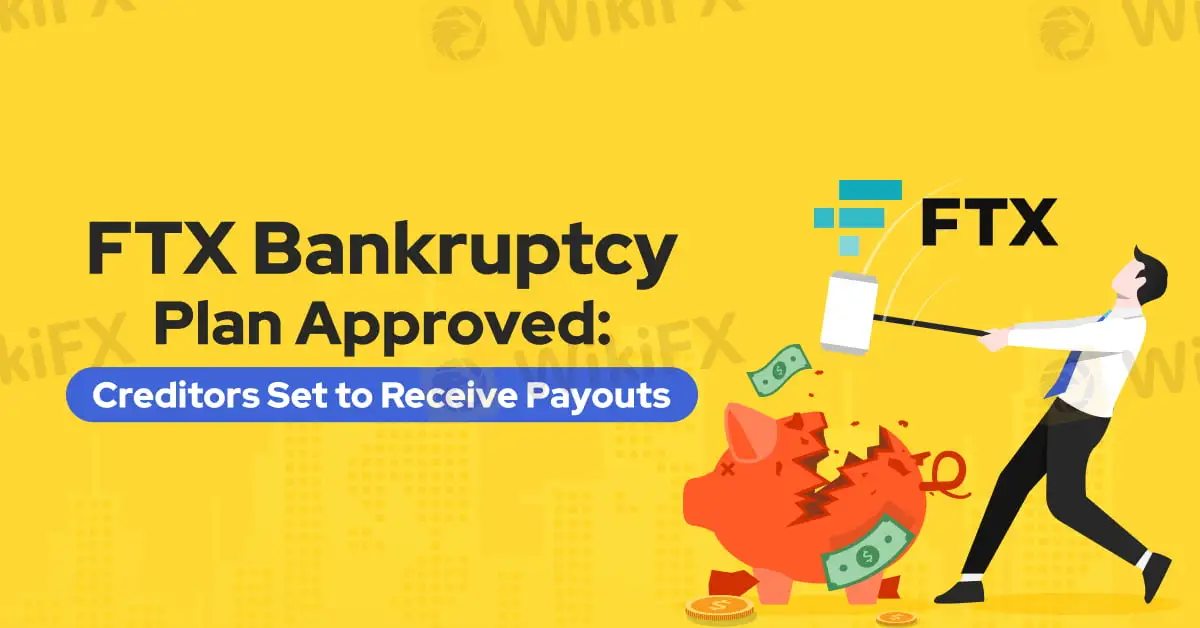简体中文
繁體中文
English
Pусский
日本語
ภาษาไทย
Tiếng Việt
Bahasa Indonesia
Español
हिन्दी
Filippiiniläinen
Français
Deutsch
Português
Türkçe
한국어
العربية
FTX Bankruptcy Plan Approved: Creditors Set to Receive Payouts
Abstract:A U.S. bankruptcy court has given the green light to FTX’s reorganization plan, signalling the end of the two-year legal process following the cryptocurrency exchange's collapse in late 2022 amid widespread fraud allegations. This decision sets the stage for the distribution of funds to the company’s creditors.

A U.S. bankruptcy court has given the green light to FTX‘s reorganization plan, signalling the end of the two-year legal process following the cryptocurrency exchange's collapse in late 2022 amid widespread fraud allegations. The decision, made by Judge John Dorsey of the U.S. Bankruptcy Court for the District of Delaware, sets the stage for the distribution of funds to the company’s creditors.
During a hearing, Judge Dorsey approved the plan, which promises that 98% of creditors will receive at least 118% of their claims in cash. The plan gained strong support, with approximately 94% of creditors in the “dotcom customer entitlement claims” class—representing around $6.83 billion in claims—voting in favour of the reorganization. Judge Dorsey commended the restructuring process, describing it as a “model case” for handling complex Chapter 11 bankruptcies.

Despite this progress, the plan has not been without controversy. Sunil Kavuri, representing FTXs largest creditor group, voiced concerns over the proposed cash payouts. Kavuri argued that creditors should receive their compensation in cryptocurrency, citing potential tax liabilities tied to cash distributions as a significant issue. He suggested that the payouts in digital assets might mitigate these concerns.
However, David Adler, an attorney for a group of creditors, countered these objections. Adler pointed out that FTX lacked the necessary cryptocurrency reserves to offer in-kind distributions. Judge Dorsey ultimately rejected the idea of repaying creditors in cryptocurrency, particularly in the exchange's native token, FTT. The judge underscored that the value of FTT had effectively fallen to zero since the token's value was closely tied to the now-defunct exchange, leaving no prospect for it to regain any value in the future.
In recent weeks, FTT saw a brief resurgence in its market value, rising by over 70% to reach $2.70—its highest price since March 2024. As of September 30, there were around 30,600 FTT holders, and the tokens market capitalization hovered at approximately $330 million. However, FTT had been excluded from FTX's repayment plan in July 2024 due to its “equity-like characteristics,” further complicating its role in the bankruptcy proceedings.
Plans for a potential reboot of FTX, dubbed “FTX 2.0,” were considered but eventually shelved. According to court documents, no investors showed interest in committing the necessary capital to relaunch the platform.
FTX‘s downfall came under the leadership of its former CEO, Sam Bankman-Fried, who was convicted of fraud in November 2023 and sentenced to 25 years in prison. Several other executives involved with FTX, including Caroline Ellison, Gary Wang, and Nishad Singh, also faced legal consequences, with Singh’s sentencing expected later this month.
This marks the final chapter in one of the most high-profile collapses in the cryptocurrency world, as the creditors now move closer to recovering a portion of their lost funds.

Disclaimer:
The views in this article only represent the author's personal views, and do not constitute investment advice on this platform. This platform does not guarantee the accuracy, completeness and timeliness of the information in the article, and will not be liable for any loss caused by the use of or reliance on the information in the article.
Read more

Bybit Shuts Down NFT Marketplace Amid Crypto Market Downturn
Bybit announces the closure of its NFT marketplace, citing efforts to streamline offerings. Discover the latest trends in the declining NFT market and its shift to utility-based growth.

Galaxy Digital Settles $200M in Luna Token Manipulation Case
Galaxy Digital pays $200M to settle Luna token manipulation probe by NY regulators, linked to TerraUSD’s 2022 crash, impacting crypto market stability.

Vanuatu Passes VASP Act to Regulate Crypto and Digital Assets
Vanuatu's new VASP Act regulates crypto businesses, enforcing strict licensing, AML/CFT compliance, and investor protections.

Blockchain Decentralization: Empowering a Trustless Future
In recent years, blockchain technology has rapidly evolved from a niche innovation behind Bitcoin into a transformative force across industries. At its core, blockchain decentralization refers to the distribution of authority and decision-making away from a central entity and into the hands of a distributed network of participants. This shift redefines how data is stored and verified and paves the way for trustless, transparent, and resilient systems that challenge traditional centralized models.
WikiFX Broker
Latest News
The Withdrawal Trap: How Scam Brokers Lure Victims into Paying More
FCA to Investors: Think Twice Before Trusting These Brokers
Trump\s tariffs: How could they affect the UK and your money
Trump gambles it all on global tariffs he\s wanted for decades
TradingView Brings Live Market Charts to Telegram Users with New Mini App
Trump tariffs: How will India navigate a world on the brink of a trade war?
IG Group Acquires Freetrade for £160M to Expand UK Investment Market
U.S. March ISM Manufacturing PMI Released
Should You Beware of Forex Trading Gurus?
Vanuatu Passes VASP Act to Regulate Crypto and Digital Assets
Currency Calculator







